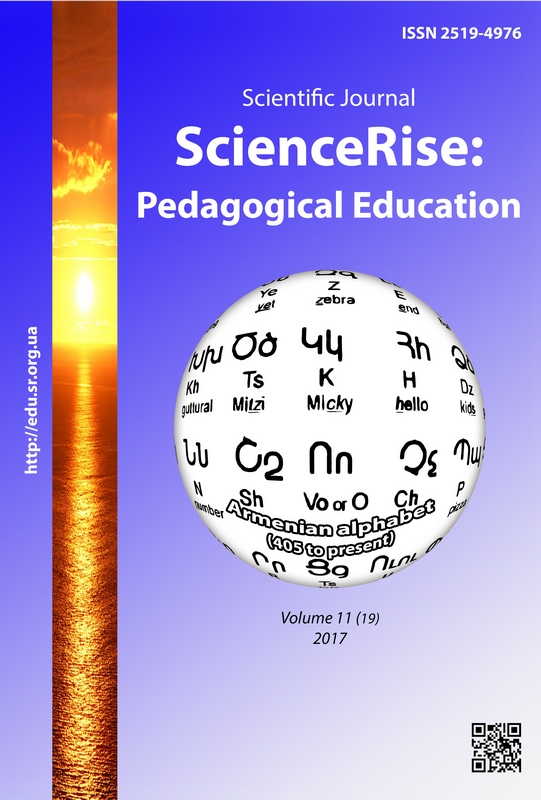The pedagogy of freedom in the paradigmatic space of humanistic upbringing systems
DOI:
https://doi.org/10.15587/2519-4984.2017.116812Keywords:
upbringing environment, pedagogy of freedom, invariant principles, parametric model, free self-determinationAbstract
The research deals with the conceptual foundations of the pedagogy of freedom as a qualitatively new direction of alternative pedagogy, which successfully functions in the paradigmatic space of upbringing systems of humanistic orientation. The historical retrospective of the formation and development of the philosophical and pedagogical ideas of upbringing by freedom and the main directions in which ideas of free upbringing are developing have been outlined. The system of invariant principles that constitute the conceptual basis of the pedagogy of freedom and the parametric model of the types of upbringing environment in which the humanistic positions of the leading representatives of free upbringing are localized, as well as the possibilities and practical experience of the introducing and functioning of the concept of the pedagogy of freedom in domestic educational and upbringing space of today, are presented. It is proved that the pedagogy of freedom, being the most thorough and integral concept among the humanistic educational systems, deduces the idea of upbringing by freedom onto the level of integrated realization in contemporary socio-cultural conditions and may become the theoretical basis for the reconstruction of the modern upbringing system of Ukraine, aimed at the development of an individual as a unique personality, the subject of his/her own life
References
- On Higher Education (2014). Verkhovna Rada of Ukraine, No. 1556-18. Available at: http://zakon2.rada.gov.ua/laws/show/1556-18
- Thesaurus UNESCO (2007). International Bureau of Education. Available at: http://www.ibe.unesco.org/en/services/publications/ibe-education-thesaurus/2007-edition.hfml
- Rastrygina, A. M. (2004). Pedagogy of Freedom: Methodological and socio-pedagogical bases. Kirovohrad: Ltd “Imex” LTD, 260.
- Rastrygina, A. M. (2003). Parametric Model of the Free Upbringing Area. The Role of Education for Economic, Social and Cultural Development. Kirovohrad: RVV KDPU im. V. Vynnychenko, 122–125.
- Sokolyanskyi, I. (1928). Some of the main issues of soviet pedagogy. Soviet education, 12, 6–12.
- Suhomlinskiy, V. A. (1984). One hundred advice to the teacher. Kyiv: Soviet school, 254.
- Bekh, I. D. (1998). Personality oriented education. Kyiv: IZMN, 204.
- Bekh, I. D. (1994). The psychological essence of humanism in the upbringing of a personality. Pedagogy and Psychology, 3, 3–12.
- Kulnevich, S. V. (2001). The pedagogy of a personality. From concepts to technology. Moscow, 69–76.
- Khairulina, V. M. (2011). Know the heart. Pedagogical discourse, 10, 500–505. Available at: http://nbuv.gov.ua/UJRN/peddysk_2011_10_123
- Kevishas, I. (2014). The space for manifestations of spirituality in the process of preparing a future teacher in the university. Scientific notes. Seria: Pedagogical sciences, 113, 3–13.
Downloads
Published
How to Cite
Issue
Section
License
Copyright (c) 2017 Ionas Kievisas, Alla Rastrygina

This work is licensed under a Creative Commons Attribution 4.0 International License.
Our journal abides by the Creative Commons CC BY copyright rights and permissions for open access journals.
Authors, who are published in this journal, agree to the following conditions:
1. The authors reserve the right to authorship of the work and pass the first publication right of this work to the journal under the terms of a Creative Commons CC BY, which allows others to freely distribute the published research with the obligatory reference to the authors of the original work and the first publication of the work in this journal.
2. The authors have the right to conclude separate supplement agreements that relate to non-exclusive work distribution in the form in which it has been published by the journal (for example, to upload the work to the online storage of the journal or publish it as part of a monograph), provided that the reference to the first publication of the work in this journal is included.







